- Reflect Festival, the largest technology and entrepreneurial event of its kind in Cyprus, wrapped up on Friday evening, October 21, welcoming approximately 5,000 attendees in the process, who flocked to Limassol’s marina area to take in some of the insights shared during the numerous panel discussions, link with like-minded professionals, and exchange views on the latest innovation and startup trends.
The festival kicked off on the morning of October 20, where co-founder Stylianos Lambrou and national chief scientist Nikolas Mastroyiannopoulos led the opening ceremony. The chief scientist also took part in a fireside chat with the vice chairperson at the research and innovation foundation Stavriana Kofteros, who examined the power and potential of the technology ecosystem in Cyprus.
Below, we will take a look at a few of the highlights of an incredibly rich, multi-faceted event, filled with intriguing analyses, debates, and conversations, all fueled by aspirational outlooks, positivity, determination and optimism for the future of Cyprus’ business, innovation and technology ecosystem.
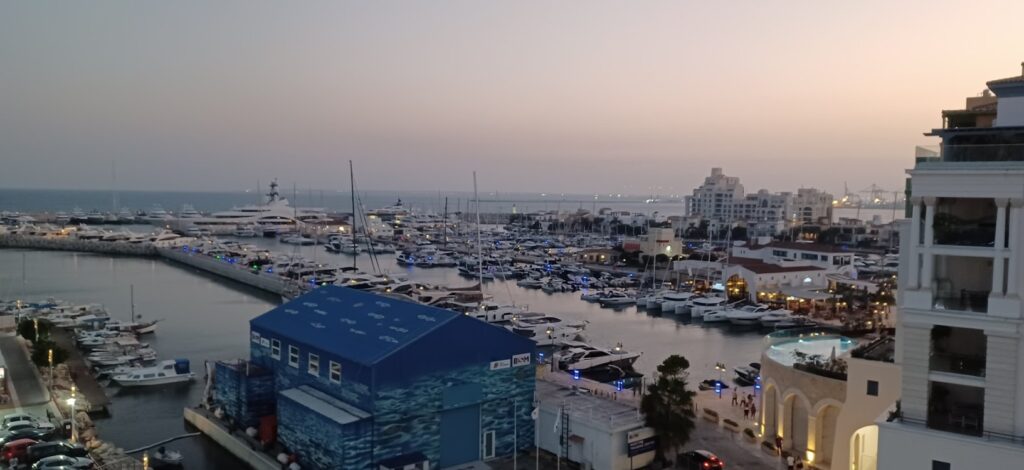
Reflect Festival took place at the Limassol Marina and Medieval Castle area
Reflect Festival: Day 1
The legal aspects of relocating to Cyprus
The growth of Cyprus’ technology and startup ecosystem is directly related to the island’s service-oriented economy, with legacy firms seeking to combine their experience of the local market with the modern demands of the market to fuel the local economy’s transformation.
In this regard, it is crucial that legal compliance is of paramount importance to businesses, whether they be local startups that were founded in Cyprus or recently-relocated enterprises that seek to expand their operations both in and out of the island. A panel discussion at Reflect Festival sought to shed light on this particular aspect.
The discussion was moderated by Elias Neocleous, Managing Partner at Elias Neocleous & Co, legal consultants Fabian Cabeza and Polina Romanova, also from the aforementioned firm, as well as Spyros Ioannou, Partner and Head of the Tax Department at audit and tax firm Primus.
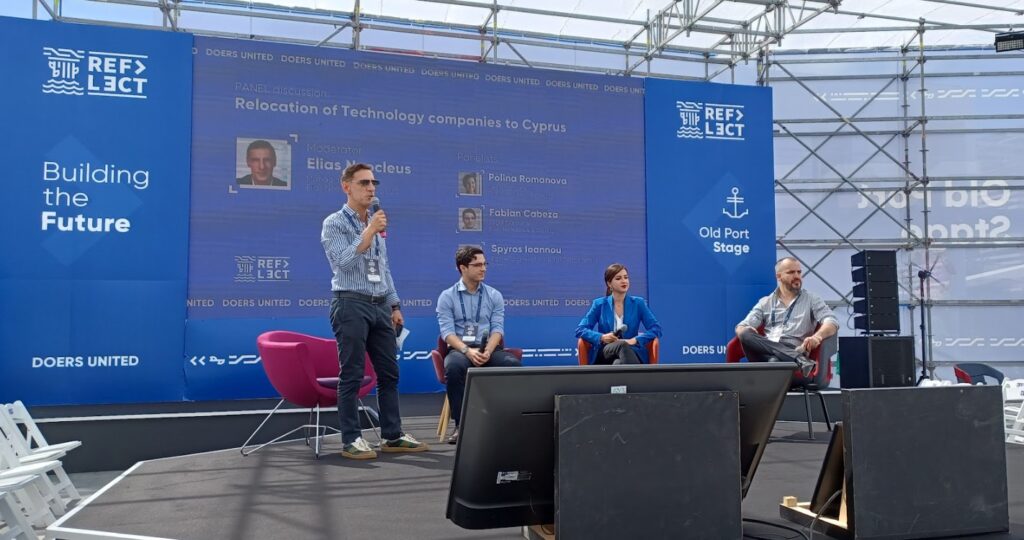
Elias Neocleous moderating a panel discussion on the legal aspects of relocating to Cyprus
Neocleous commented that the mechanics of modern business, particularly in the field of technology, can be difficult to understand, particularly because they change and evolve at such a fast pace.
“This is why at our firm, we have created a group that consists of lawyers, engineers, and other people who are extremely acclimated and familiar with all of the latest trends, be they subtle or more substantial, in technology so that they can understand the business of the client and therefore be in a position to advise them throughout the entire process. From the very start of setting up their business to the point that they can achieve actual growth, hopefully in the form of an IPO or something similar,” he said.
Fabian Cabeza said that Cyprus is a great place for technology companies, primarily because it is a great place for business in general.
Firstly, he mentioned that it has very strong foundations, such as an attractive corporate and income tax regime, as well as a legal system based on UK common law, noting that it is the lingua franca of commerce.
“Cyprus also has a regulatory framework aligned with the EU, which can at times seem a bit cumbersome, but really, this is because it meets all international standards, which allows you to conduct business anywhere else in the world. And it also helps to secure the business itself. Cyprus has also recently revised its immigration policy in terms of non-EU technology professionals, allowing for a far more streamlined process with the creation of the business facilitation units, as well as granting working rights to family members. So all in all, a proper business mindset that delivers in terms of compliance,” Cabeza said.
“But really what I think is the real reason why companies should come here is the narrative that has taken hold in recent years, which is Cyprus’ transformation into a tech island. Stories and narratives are their own indicators. And I think Cyprus’ image as a tech Island has really united stakeholders. We can see this was the Cypress Vision 2035, as well as the fact that there has been a 25 per cent increase in innovation performance in 2020, more than double the EU’s average, and growing. So the progress has been really palpable,” he added.
On her part, Polina Romanova spoke about her own experience of relocating to Cyprus as a professional, which, combined with the feedback she has received from international clients, contributes to her belief that Cyprus is the country she would strongly recommend to companies and foreign talent for relocation.

Polina Romanova speaking on the benefits of relocating to Cyprus
“Cyprus is a very attractive destination because of three reasons. First of all, there is the comfort and cost of living, which is relatively small compared to other European countries. The quality of living continues to grow here every year, as you can see the development that’s taking place, the influx of people that create new things here. Second is the travel accessibility. I know that people from the technology industry don’t want to be stuck in one place all the time, as you can work remotely. And this is very important for you to have the opportunity to travel to work from other countries. For example, being based in Cyprus allows you to be located in the middle of many continents. You can go to Europe, you can go to the United Kingdom, the Middle East. Yes, accessibility can be improved, but in any case, there are many options now,” she explained.
“And the last, but I think the most important aspect is the IT community that we have here. For example, you can go to a country with a perfect legal regime, but you will not find your colleagues there, you will not find business partners there, and you will not find people from your country there in the long run. For example, when I came here, I didn’t know a single person in Cyprus, roughly six months ago. And I was really a bit disoriented. But when the six months passed, I felt like Cyprus is my second home. And this is because there are a lot of opportunities for networking, finding your business partners, for finding funding and investments. There are conferences like this one, there are events that can help you each week. And from my clients’ experience, I can see that they found investors in those events, they found their contractors there, and they found their friends there. This is what’s great about Cyprus,” she added.
Meanwhile, Spyros Ioannou conceded that while things may not be perfect or fully mature at present, they are moving in the right direction. He noted that one can see the growth simply by viewing a picture of Limassol from a few years ago and comparing it with how the city is at the moment.
“A few years ago, you would not see the same number of entities, the number of groups, the number of people that have come over to Cyprus and are employed here. These are true facts. So we are no longer focusing on Cyprus’ sunny weather or its friendly tax system. Right now, we have solid evidence as to why Cyprus is a preferred jurisdiction,” Ioannou said, noting the number of benefits that Cyprus can offer to companies who set up on the island.
Tech Island Summit: Venture funds and their role in growing ecosystems
At the beach stage, the most scenic venue of the festival, a panel discussion looked at the role of venture capital in emerging markets, including how they can assist with the development of the local ecosystem, driving innovation and progress through the participation and involvement of experienced VC players.
The panel consisted of Dusan Duffek, Partner at Zero One Hundred and co-founder at Reflect Festival, Vivi Papasouli, Mandate Manager at European Investment Fund, Marie Therese Fam, Partner at Silicon Badia, Siarhei Kostevitch, CEO and Chairman of the Board of Directors at ASBIS, Andreas Panayi, co-founder and Managing Director at Kinisis Ventures, Yuriy Romanyukha, CEO at iClub Global Cyprus and Mentor at Startup Wise Guys, as well as Kirill Gurskiy, Head of Games & Entertainment at the investment arm of GEM Capital.
“I believe it is inevitable that mature tech companies here on the island may and should play a vital role in the acceleration of tech startups and help them to realise their ideas, turning them into real solutions,” Kostevitch stated.
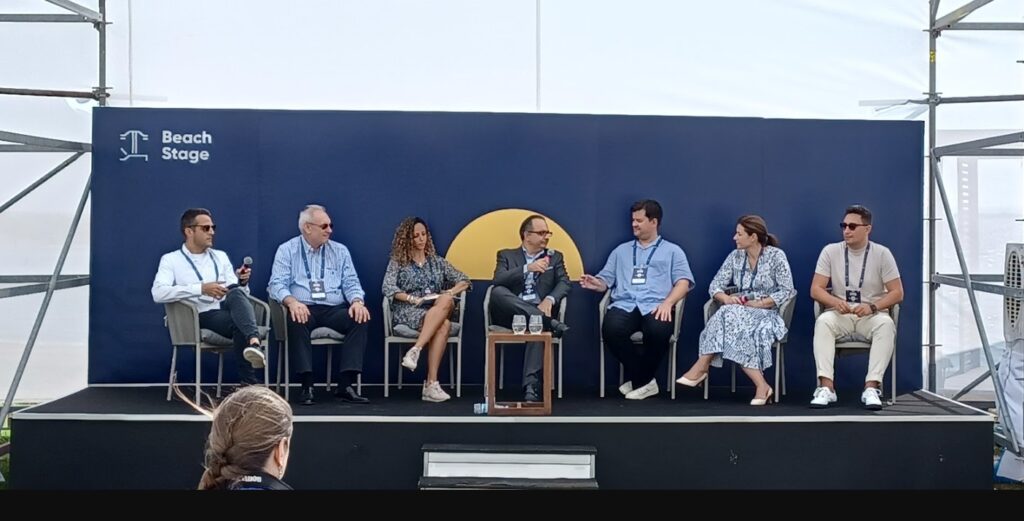
“What we are looking for basically, first of all, is to invest in the companies who really have brilliant ideas and make world-class innovations, disruptive new technologies, or technologies and ideas that are very completely complementary to our core business,” he added.
Moreover, Kostevitch explained that the company is very patient with the companies they become involved with, noting that they are not looking for quick wins and that they are there for the journey. In addition, he stressed the importance of young entrepreneurs being open to learning the corporate or technology corporate world, as well as being open to sharing their ideas.
“We must be open to learning how to develop a project that is both technologically and production-wise viable, otherwise we are not interested,” he said.
“Last but not least, what I’d like to say is that I’m very excited to oversee and to be part of the latest development of investment and funding in Cyprus’ technology ecosystem. There has been great cooperation with the government during the past two years, and it gives me great comfort to not only enter a startup, but when the time comes, we will also make the right exit, both for them and for us,” he concluded.
Challenges & opportunities in the adoption of digital assets
Continuing the number of events held as part of the Tech Island Summit, a panel discussion at the conference’s beach stage looked into the challenges and opportunities in the adoption of digital assets.
“As more and more people become interested in the potential of blockchain and other distributed ledger technologies, there is a growing awareness of the possibility of decentralisation and Central Bank Digital Currencies (CBDC),” the agenda explained.
Moreover, the adoption of such assets remains extremely low, so the discussion looked into what the main obstacles are in regard to implementing CBDC in the region.
The panel was comprised of Joseph Borgese, Founder and CEO at Borghese Ventures, Walid Tarabih, Former Digital Transformation Advisor At The UAE’s Prime Minister’s Office and Founder and Ceo At PlatX, Demetra Kalogerou, Former Chairwoman at the Cyprus Securities and Exchange Commission (CySEC), Vladimir Vishnevskiy, Partner at Quonota Investment Ltd, Monica Ioannidou Polemitis, Director of Strategy and Management Consulting At Baker Tilly South East Europe, as well as Antonis Polemitis, Chairman of the Board at Tech Island.
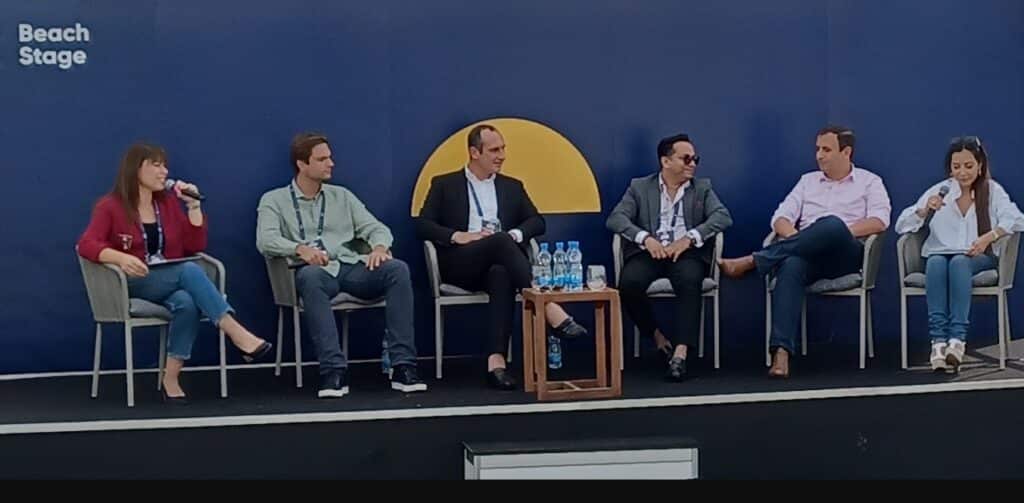
Former CySEC chairwoman Demetra Kalogerou joined a panel discussion on the adoption of digital assets
Walid Tarabih said that “we need to understand why we are implementing regulations first, and to do what we need to look at it from a perspective of governance”.
“The overarching goal of any government is to create a great and safe place for their citizens at the centre of it, to make sure that they can go within that space. And the approach they take is quite simple in that sense. So they look at the risks and challenges, how they create benefits through certain actions, as well as the aspect of accountability and the firms operating in that space,” he added.
Vishnevskiy spoke about his experience running a Switzerland-based crypto hedge fund, noting that part of his remit is to ensure that their investors are properly protected, as well as the fund’s directors and companies.
“I struggle to remember a company in the crypto space that started and said, ‘okay, we’re going to go and do everything by the book’, and succeeded. This is super difficult.”
“Obviously, a lot of the regulation that was applied to companies we have seen is still from the old world, from the traditional world. And I would say that because of this they have struggled to attract clients,” he added, providing an example of two banking firms.
Former CySEC Demetra Kalogerou said that with the introduction of the relevant regulation allowing firms to register crypto exchanges in Cyprus for the first time, the regulator expects a certain number of actions and information from these companies, which is what they are expected to provide to remain compliant. However, she noted that, at present, the regulation focuses on anti-money laundering and financial crime practices.
“There need to be certain systems, controls and procedures in place, combined with robust cybersecurity, as well as ISO standards in some cases,” Kalogerou said.
“Actually, if we regulate the whole spectrum of a crypto exchange, from A to Z, the operation, the best execution, the issue market abuse, which is of course very important again to prevent insider trading, and anti-money laundering, it helps us to protect investors,” she added.
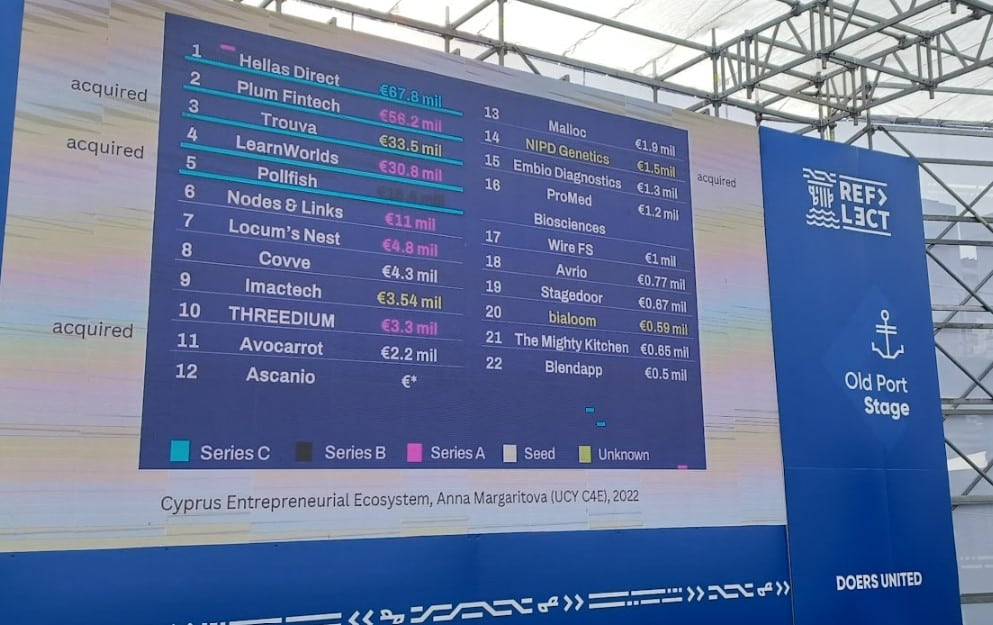
Cypriot startups have gathered a lot of interest and investment
Reflect Festival: Day 2
The potential of Cyprus as an international business and tech centre
Cyprus has come a long way in its efforts to become a viable, vibrant business, innovation, technology and startup centre in the region. Cyprus’ potential to further grow in this regard was explored in a panel discussion involving Invest Cyprus CEO George Campanellas, Head of Commercial Banking at Hellenic Bank Andreas Papadopoulos, Director of Client Relations at Polygrowth Bogdan Maslesa, and Heart Group and Reflect Festival co-founder Stylianos Lambrou.
“We are starting to find that some of the earlier startups are maturing into more traditional companies and we are right there with them, we want them to grow, because there will be a domino effect. “We feel quite strongly that this pool [of companies] will generate a flow of funding, whether it’s through financing or sponsorships,” Papadopoulos said.
“But going back to my original point, there is a serious issue in education. Education is fundamental in terms of being a crossroad and nursery for young entrepreneurs who have the correct mindset. We are already seeing some progress being made through the teaching of entrepreneurship in schools, the Junior Achievement initiative, as well as the events involving the Research and Innovation Foundation, among other things. If we have the right roots, then we will flourish. And I must say, I don’t know many countries where you can literally ski in the morning and within an hour go for a swim. We have a really unique place in Cyprus. We just need to admire it, and take care of it,” he added.
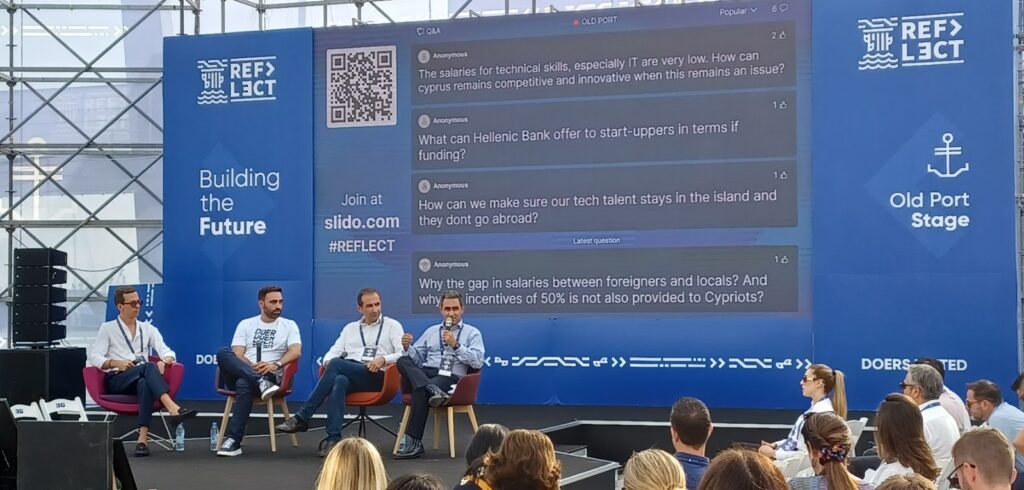
Invest Cyprus CEO George Campanellas, Head of Commercial Banking at Hellenic Bank Andreas Papadopoulos, Director of Client Relations at Polygrowth Bogdan Maslesa, and Heart Group and Reflect Festival co-founder Stylianos Lambrou
Answering a question regarding the issue of brain drain, meaning the emigration of highly educated or qualified members of the local workforce, Stylianos Lambrou said that Cyprus suffered in this regard during the previous decade, particularly as a result of the financial crisis.
However, he noted that this is something that has started to become addressed in a more methodical manner, with incentives being provided to Cypriot professionals who wish to repatriate after spending a number of years working abroad.
“I think that all of the Cypriots who are abroad have it in their mind that one day they’ll be back, it’s in our culture to be close to our family,” Lambrou said.
“In addition, I believe that Cypriots are intrinsically motivated to help their country. In tough times, we work together, which is really, really important. I believe that in the next few years, more and more Cypriots who are currently abroad will return,” he added.
Invest Cyprus CEO George Campanellas explained that Cyprus, being a young ecosystem progressing through its early stages, is naturally coming across some issues, whether they concern education-related matters, infrastructure or financing.
“However, we are currently utilising the funds made available by the European Union’s Recovery and Resilience Fund. As a result of this investment, by 2025, we will make Cyprus much greener and much more digital,” Campanellas said.
“It should be noted, that because we are a demand-driven economy, we don’t follow the model of ‘build it and they will come’, but we go by demand. And let’s not forget that this also creates a number of other events, including investment opportunities for people who are involved with the digitisation of the public sector, as well as people who are investing in infrastructure. So yes, there is a long way to go, but what has taken place already over the past few years is remarkable. It reaffirms that we are going in the right direction. We have a vision for the country and a long-term growth model,” he concluded.
The Cypriot innovation ecosystem: its evolution and what comes next
On Friday afternoon, Michael Tyrimos, Managing Director at Capacitor Partners, delivered one of the most insightful solo presentations of the festival, delving into the evolution and current predicament of the Cypriot innovation ecosystem and offering his thoughts on what might come during the coming decade.
In terms of offering a lesson that Cyprus could emulate, Tyrimos explained that the reason that Silicon Valley ended up becoming a more successful location for innovation, technology and entrepreneurship over competing US-based locations was that it not only allowed firms to flourish, but it also evolved into an interconnected, decentralised network, with all of the consequent benefits that this entails.
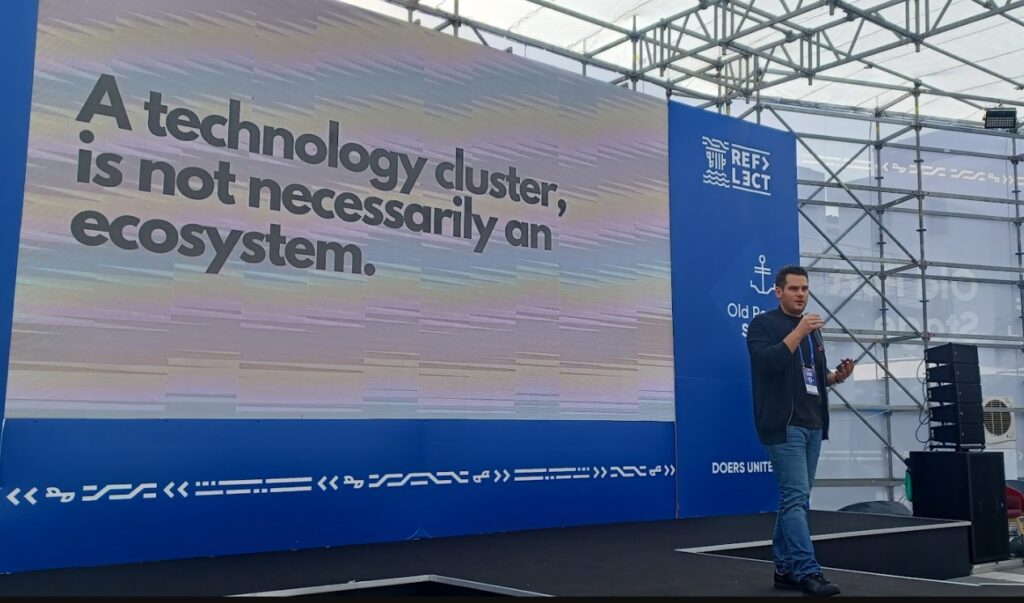
Michael Tyrimos, Managing Director at Capacitor Partners
In Cyprus, Tyrimos explained, the startup ecosystem, which is still nascent, was practically non-existent as recently as ten years ago. This led to the creation of informal meet-up events between the few people interested or active in this space. This then led to the creation of hackathon events, drawing in sponsors, facilitating the congregation of intelligent, predominantly young, forward-thinking people, and allowing them to collaborate and build products together.
Fast forward a few years into the future and we can now see the private sector becoming much more engaged with this ecosystem, which in turn drew the attention of the public sector, resulting in the creation of the role of the Chief Scientist, the Research and Innovation Foundation, as well as the Deputy Ministry of Research, Innovation and Digital Policy.
“So there’s a lot of support currently available. You can see incubators, co-working spaces, funding, consulting, the public sector becoming involved,” Tyrimos said.
“What’s next? What should we expect in the next 10 years? Of course, we’re a very young ecosystem. And on many occasions, we look down upon ourselves and say, not much has happened in Cyprus over the last 10 years. However, there were so many things that have happened,” he added, referencing a number of successful startups, initiatives and actions that he had delineated earlier in the presentation.
He went on to say that in the next 10 years, we should see Cyprus’ startup movement grow in stature on the global stage, noting that immigration-related constraints are coming off, allowing the island to attract more global talent.
“We have the startup visa scheme, we have tax regimes, and we are trying to encourage more entrepreneurs and technology companies to move here. So our next big move is to actually be able to move and have more ties to what’s happening globally. We’ve seen this happening in the Greek ecosystem, where Greek startups have attracted funding from Silicon Valley companies,” he said.
“Right now Cyprus is at a great point, however, Cypriot companies have a difficult time scaling up in Cyprus. So they’ll go and look for funding abroad. The good news is that both private venture funds, as well as the Cyprus Equity Fund, are on the horizon. We’re trying to reduce red tape as well. And a key component to that is the creation of something called CY Login, involving a digital signature and a digital seal, so it will make everyone’s lives easier in terms of opening and running a company,” he added.
Tyrimos also stated that it is necessary to see an increase in technical talent, noting that many startups, mature organisations and other festival attendees have encountered difficulties in trying to attract, identify or hire the specialist personnel they require.
“So we have to rely on our future, the future of education,” he said.
Moreover, he mentioned the emergence of new innovation verticals. According to a study by the University of Cyprus, 9 per cent of the Cypriot ecosystem is now based on life science verticals.
“We didn’t have that a few years back. But right now we are seeing various companies excelling in biotech, and expanding to other countries, including the United States,” Tyrimos said.
“The fourth factor is to create a stronger foreign direct investment in headquartering. This is one of the things that Invest Cyprus and Tech Island are doing, resulting in many great companies moving to Cyprus, with the most recent one, JetBrains, being one that many developers are excited about,” he added.
Tyrimos also spoke on the importance of increased expert contribution, including through the relocation of their companies’ operations, or other parts of their business, to Cyprus.
“And last but not least, we must increase the percentage of our gross domestic product based on ICT. Last year, a study by Tech Island showed that 7 per cent of our GDP was based on the ICT sector, making it almost as big as shipping, which is a major sector in Cyprus,” he said.
“So the challenge now is to take this contribution to 15 per cent of GDP,” he added.
Tyrimos wrapped things up by saying that Cyprus is still a new ecosystem and has a long way to go before it matures.
“We know that things are not perfect. But at the end of the day, no one said it would be. It takes everyone to push forward in order to achieve what must be done in the next decade or two for Cyprus to get noticed on the global stage,” he concluded.
Will we see a unicorn in Cyprus?
Tyrimos stuck around for the next item on the agenda at the Old Port stage, this time moderating a panel discussion on building unicorns, meaning privately held startup companies valued at $1 billion, and the possibility of seeing one emerging in Cyprus.
“While unicorns are rare, their numbers are growing, especially within emerging markets like China and Brazil. They bring life-changing innovations for consumers and transform how we do business” the programme noted.
“If the late ’90s marked the era of IPOs, with companies going global and raising 69 billion USD, 2020 brought about unprecedented acceleration in innovations driven by the pandemic, with an increase of 350 per cent in the number of unicorns by mid-2021,” it added.
The panel was comprised of Alex Loizou, CEO at Trouva, Maria Terzi, co-founder and CEO at Malloc, Maria Markidou Georgiadou, Managing Director at Cyprus Seeds, as well as Georgios Georgiadis, Managing Partner at Whitebeam Ventures.
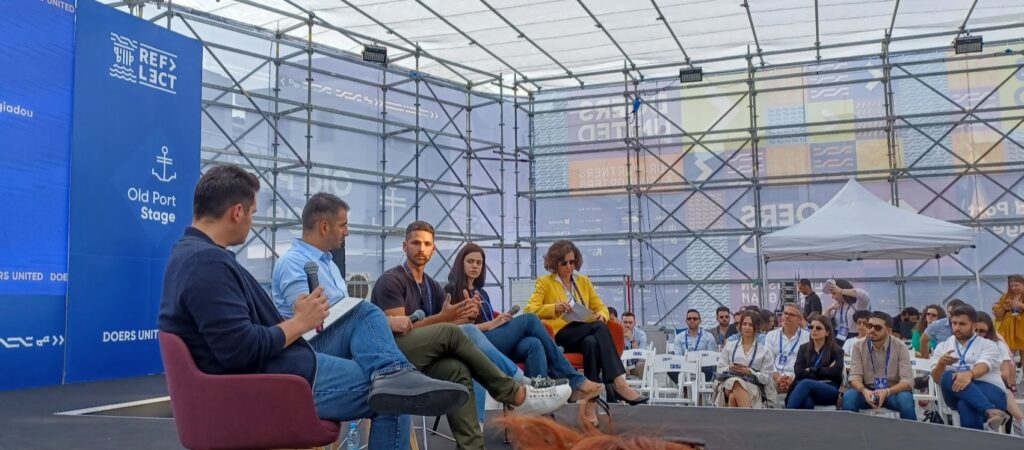
Alex Loizou speaking on what helped London startups and what Cyprus can learn from it
“I was quite lucky to be part of the London ecosystem. going back to around 2012-2013, you could see the right amount of capital coming in. The talent was available. We saw more and more people that were coming into the technology sector and choosing it over banking and other sectors. We had the first signs of a community being built up, a network of sorts coming along,” Loizou said.
“It’s really refreshing to see that happening in Cyprus as well. As we’re moving forward, this is happening. I think that first of all, you need to have capital, you need talent, and you need community or networking in order to make it happen,” he added.
Furthermore, Loizou said that Cypriot startups, as well as the local ecosystem in general, have room for improvement when it comes to the networking side of things, noting that there are a lot of people, both in and outside of Cyprus, who can provide support and assistance but are not being leveraged properly.
“That is a shame. In other, countries, people do that a lot more than we do,” he commented.
“Now, on the other hand, you also need the government to be part of it. For example, in 2014, the FCA in the UK started building up its regulatory sandbox, which was then used by a lot of early-stage startups to build new propositions that had a major impact on how the FinTech sector evolved. Companies like TransferWise, Revolut, and so on, would have had it much harder if that wasn’t the case. I think this kind of relationship between politics and government with entrepreneurs is key,” he added.
Georgios Georgiadis explained that creating a unicorn or other startup success stories, in general, is a long-term process, not something that should be viewed as a goal that can be achieved within a few years’ time, rejecting the perceived notion of low-hanging fruit.
“At the end of the day, it’s important to create a solid base so that people can start their entrepreneurial journey from the very beginning. They need to be supported and the whole ecosystem has to become gradually become more mature. We have to be patient and understand that there are a lot of difficulties. In addition to that, we have to find our sweet spots, the specific verticals that we are really, really good at,” Georgiadis said.
“Cyprus is a small market, and startups are niche components of an economic ecosystem. And now we’re also speaking about a niche market in itself. So this makes the whole thing even more difficult. One thing to consider is focusing on a vertical that you can address as a global market from the very beginning,” he added, noting that startups have to be brave.
“It’s not going to be easy. It’s going to be a tough journey. But we have to be consistent and consistency is the key,” Georgiadis further elaborated.
Maria Terzi stated that although the startup she co-founded began in Cyprus, it embarked on its journey with a global mindset, it didn’t let itself become confined by the Cypriot market’s limited size and everything that this entails.
However, she also noted that they started with a US approach, focusing on gaining market share and using that as a basis to grow further, the company retained the positive qualities of European startups.
“People say that Europe is good for living and for holidays. But if you want to do business, you should move to the US. So what we thought when we started is that the company being based in Cyprus allows us to spend less, in terms of costs, compared to our US peers. But at the same time, we gain market share and generate new connections, and we maintain these connections, even by operating online. Our investors are online, our customers are online, and we try as much as we can to maintain them,” Terzi said.

Tyrimos moderated the discussion
“Another thing that we like to say is that in Europe, we have this mindset of predictability and sustainability. And in the US, we have a mindset geared towards growth. And the growth mindset always moves faster. But for us, the combination of the two was a great advantage, particularly now, during an economic downturn,” she added.
What is more, Terzi said that as things stand, Cyprus makes sense for the company, providing its people with a healthy balance between work and leisure.
“We continue to grow as a global startup, and we continue to try and combine the best of both worlds,” she explained.
Meanwhile, Maria Markidou Georgiadou expressed her satisfaction about sharing the stage with young Cypriot entrepreneurs, sharing their success stories, saying that this makes her extremely optimistic about the future.
“I am very passionate about the work being done, which seeks to commercialise innovative academic research from Cypriot universities, Centres of Excellence, and research institutes on the island. Why do we do that? Because we would like to attract back the talent who had to leave Cyprus and create a pipeline of startups from the academic, academic, and innovative worlds,” Georgiadou said.
“Everybody knows that the word unicorn finds its origin in a mythical creature, which was so rare that it was thought to be extremely difficult to find. And here we are 2022. They’re around. According to what I have been reading, there are around 1,100 unicorns in the world. And the biggest number is in the US, then it’s India, and China, the usual suspects. So will we have a unicorn from the scientific research efforts of Cyprus? I don’t know. I surely hope that the first one will be from Cyprus Seeds. But seriously, it’s not easy. And I think we have started on the road to seeing startups from the academic and innovative world. So you never know what will happen,” she added.
Georgiadou later added that while the first thing to come to people’s minds when discussing unicorn startups is money, however, she stressed the importance of starting with education first, not just in terms of the researchers and startups involved, but the entire ecosystem, including the VC funds and angel investors.
“We can learn from unicorn companies and see how we can improve, how we can seriously change the mindset and the culture of our people. It’s critical to any future success in Cyprus,” she concluded.







Click here to change your cookie preferences